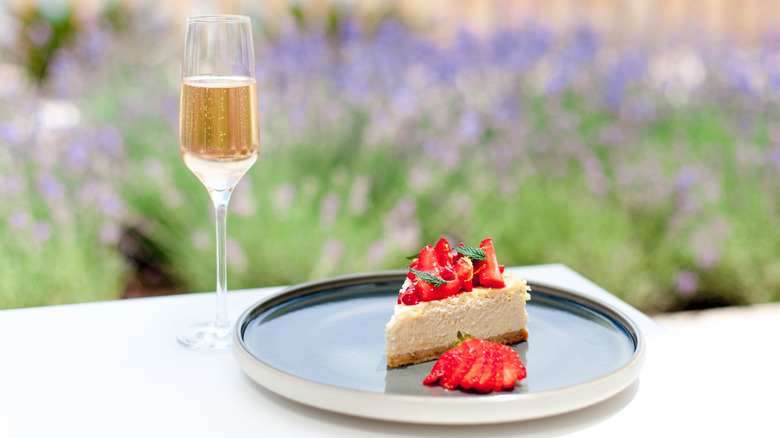Do Dessert Wines Only Pair With Dessert? We Asked An Expert
Casual wine drinkers may have favorite red, white, and rosé wines, but for less defined categories like "dessert" wines, it can be hard to parse out what to expect from a bottle and what to serve it with. You can likely infer that these wines are on the sweeter side and are served with dessert, or as a final course to meal. However, there is no industry definition for the term, and with each bottle of dessert wine differing from the last, you may wonder: Do dessert wines only pair well with desserts?
To get an answer, Daily Meal spoke to wine expert Doreen Winkler, a consulting sommelier who has curated wine lists for prestigious restaurants all over the world, including the newly-opened Mishik in New York City. Winkler says that most dessert wines are made to complement sweet desserts, and are only really suitable for this purpose. But pay attention to the word "most" — Winkler adds that some dessert wines pair well with less sweet desserts, like ones that gain a savory edge from herbs or cheese.
For one suggestion, Winkler says that Muscat de Beaume de Venise, a fortified Muscat wine, pairs well with a thyme olive oil cake. She adds that "A light sparkling dessert wine like Moscato d'Asti will go well with a goat cheese-based dessert." In fact, Moscato d'Asti pairs well with dessert and non-desserts alike, as it contrasts savory flavors with its effervescent qualities, while its fruity aromas uplift sugary desserts.
Some dessert wines can handle a savory edge
If you're a beginner at choosing dessert wines, start out with lighter-bodied choices, like the aforementioned Muscat de Beaume and Moscato d'Asti. Refreshing and not-too-sweet bottles can complement desserts that have a hint of savory rosemary or basil, to riff off of Doreen Winkler's thyme and olive oil cake suggestion. Meanwhile, a cheesecake made with goat cheese is an easy way to test out Winkler's other recommendation. And if you find that you enjoy sipping on these wines alone, experiment with enjoying them alongside savory meals.
On the other hand, heavier and/or fortified wines, like syrupy port or super-sweet "ice" wines, are better suited for sweeter desserts, such as a dark chocolate torte or rich Black Forest cake. Pairing a sugary ice wine with a meaty steak is a recipe for culinary confusion, so don't even bother. According to Winkler, dessert wines that should almost exclusively be paired with sweets include Tokaji, Beerenauslese Riesling, and Vin Santo. These wines have a more viscous mouthfeel and a higher concentration of sugars, making them likely to clash with savory flavors.
For novices at pairing desserts and wine, your best bet is to heed a sommelier's recommendations, find out which types of pairings you generally prefer, then slowly branch out into experimentation. And try to match the sweetness levels — a less sweet wine complements a less sweet dessert, and vice-versa.

